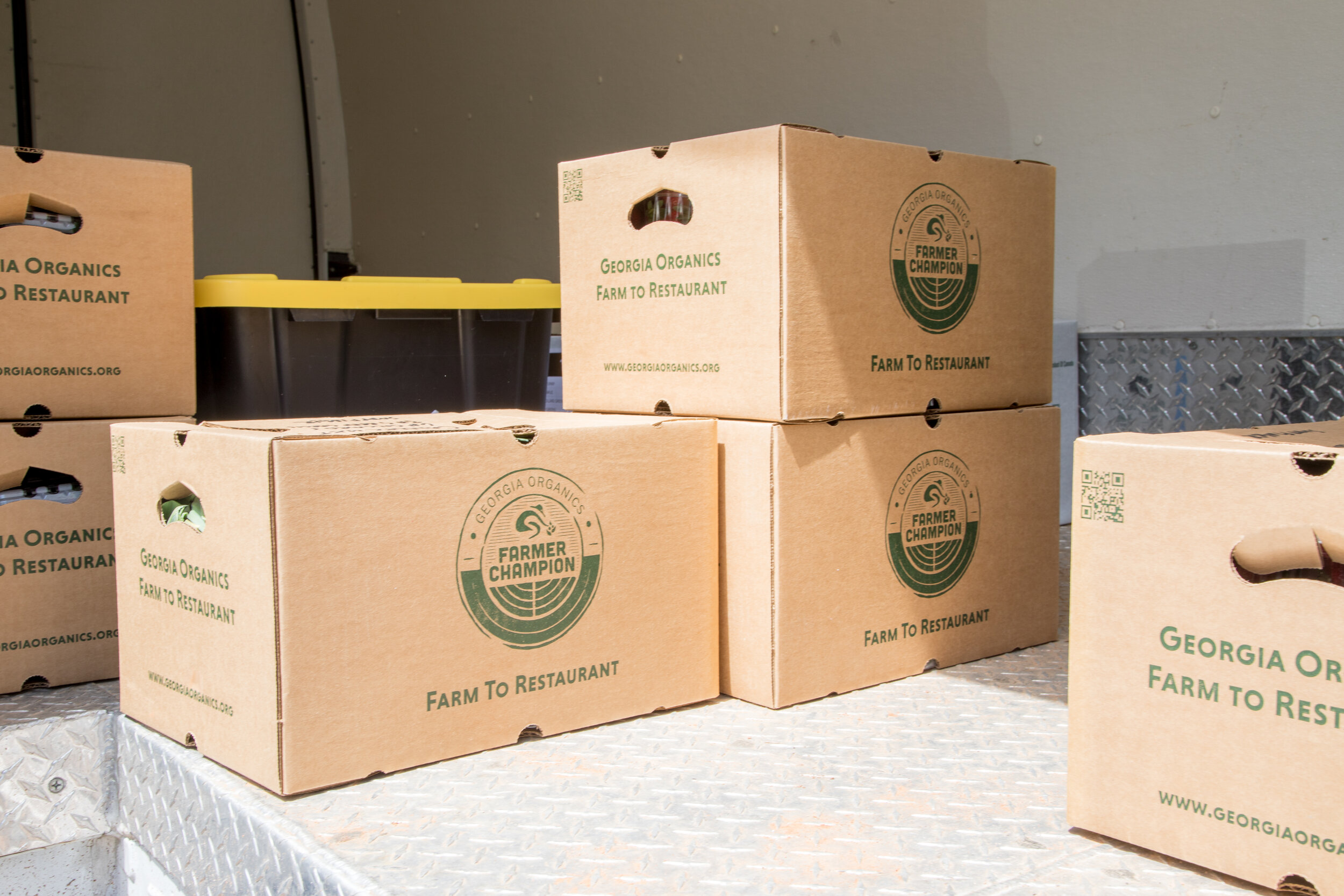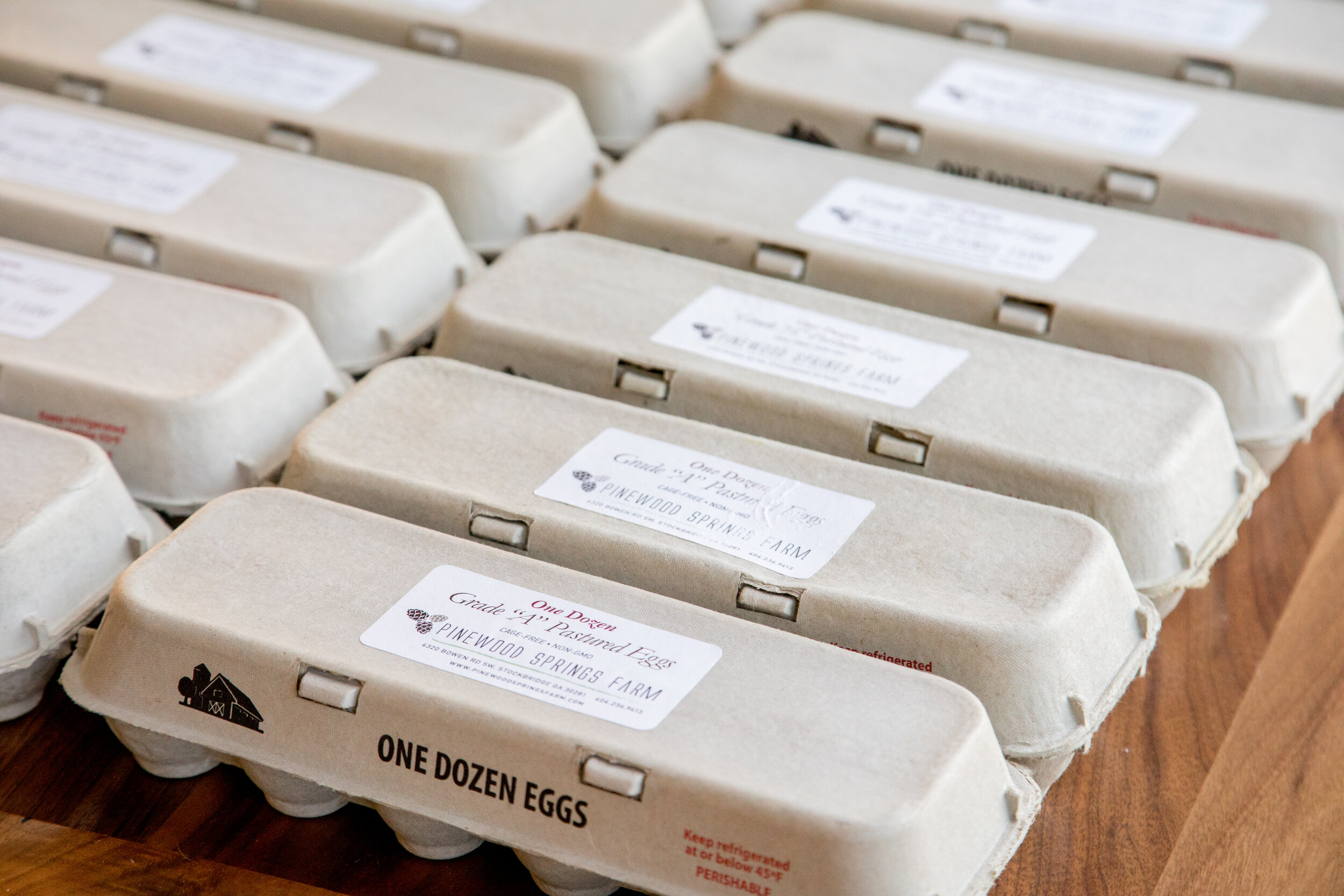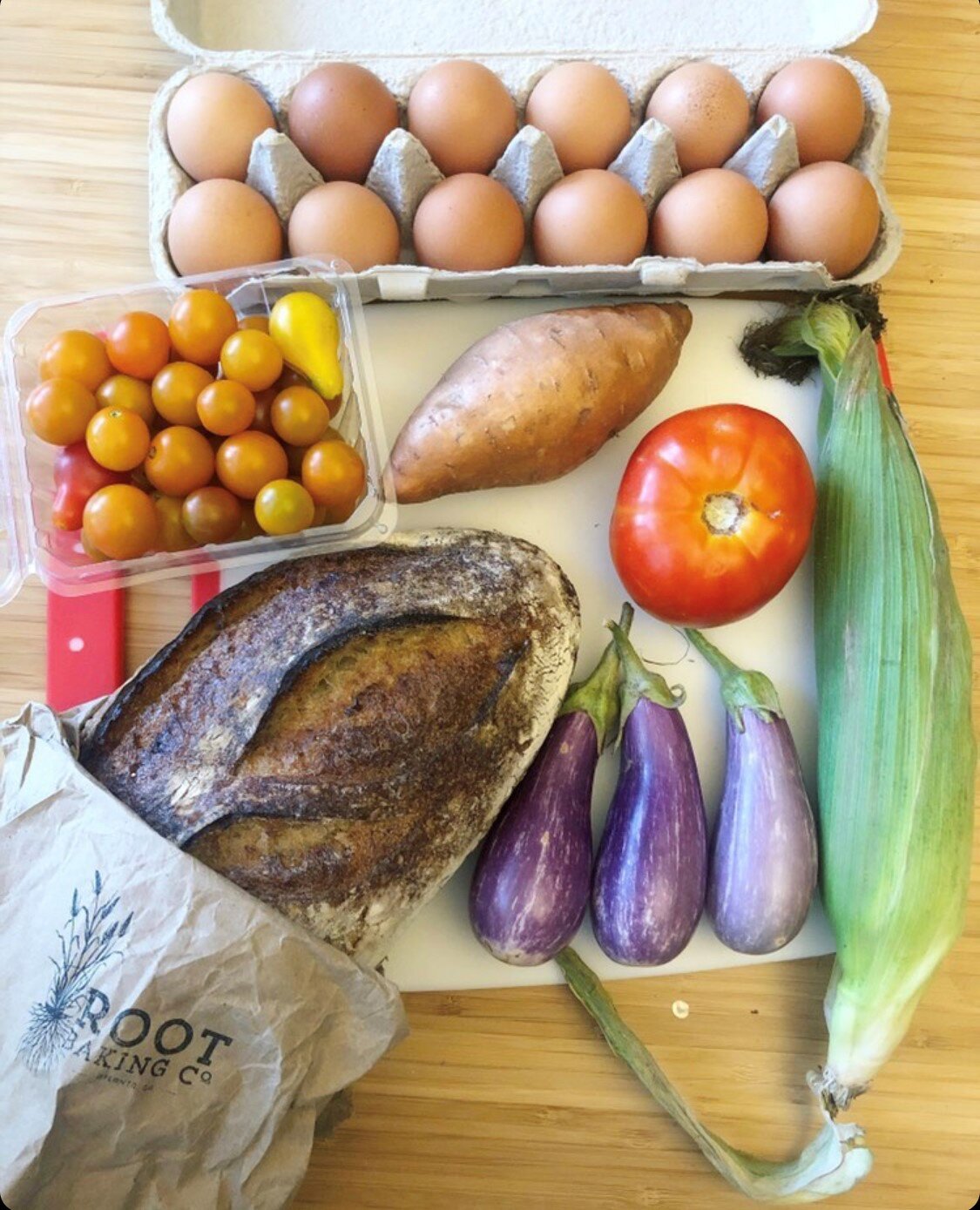Food Fight GA weekly pick-ups being assembled. (Photo credit: Kate Blohm)
In an effort to continue the Food Fight GA initiative through October, Georgia Organics seeks to raise $10,000 in funding. To learn more and donate, please visit www.foodfightga.com/donate.
By Mary Elizabeth Kidd
In mid-March of this year, as the full effects of COVID-19 set in, Georgia’s small, locally-owned restaurants were among the hardest hit businesses to suffer from pandemic-related closures.
According to the National Restaurant Association, Georgia is home to some 18,000 restaurants, which employ approximately half a million people. And with the majority of restaurants remaining closed or offering takeout-only service, a huge swath of those in the restaurant industry became one of the highest unemployment-claiming sectors since March.
Farmers also felt the blow of these restaurant closures, as this crucial revenue stream dried up almost overnight as orders for weekly menus ceased.
But Chris Wilkins of Atlanta’s Root Baking Co. wasn't willing to sit by as these two vital groups were left high and dry by unprecedented times. So, with a big idea and a call for extra hands, he reached out to the team at Ponce City Market and Jamestown Properties as well as Lauren Cox, Georgia Organics’ Organic Procurement Coordinator, who leads the Georgia Organics’ Farm to Restaurant program. Together, Food Fight GA was born.
Chef Bruce Logue of BoccaLupo, a Farm to Restaurant Farmer Champion and early participant in Food Fight GA. (Photo credit: Kate Blohm)
The mission of Food Fight GA, from the outset, has been to bring stability to the greatly destabilized industry, paying farmers to offset lost revenue, and providing fresh food to restaurant workers to help make up for lost pay. The motto: "championing farmers and feeding our restaurant family.”
“Restaurants think of their teams as family, not to mention the farmers from whom we source and who become our friends, and the Atlanta food community is doing what we can to make sure our people are safe and cared for during this uncertain time,” says Chris Wilkins.
As a one-year-old program in the organization, Georgia Organics’ Farm to Restaurant program rose to the challenge of creating a new initiative with complicated logistics. Thanks to seed funding from the Jamestown Charitable Foundation, Ponce City Market, and the Wilbur & Hilda Glenn Family Foundation, the pilot program began in early April.
Each week, Georgia Organics coordinates the orders for farm boxes full of fresh fruits and vegetables from participating farmers—along with Root Baking Co. bread and more. These goods are then delivered and packed for pickup at participating restaurants, ready to go home with restaurant team members who have faced COVID-19-related staffing cuts.
Lauren Cox, Georgia Organics’ Organic Procurement Coordinator, who leads the Georgia Organics’ Farm to Restaurant program. (Photo credit: Kate Blohm)
For Lauren Cox, the initiative made sense for Georgia Organics to manage and coordinate logistics for, particularly given her background managing farms and selling to restaurants. “For our work, it just makes sense. Farmers want to grow and sell their food, and we want to help them move that food. Essentially, we get to buoy the relationships these farmers have with restaurants through Food Fight GA to ensure they keep seeing each other week to week even while the restaurants have limited sourcing capacity. Hopefully, we’re also creating opportunities for new restaurant partners to meet farmers they never knew before in the process.”
Participating restaurants throughout Food Fight GA have been both Farmer Champion restaurants, those already a part of the Farm to Restaurant program, and restaurants in the Metro with long-standing commitments to local sourcing. Current participants include: Arnette’s Chop House, Empire State South, Five and Ten, Gunshow, Miller Union, Murphy’s, Staplehouse, The Deer and The Dove, The National, Twisted Soul Cookhouse & Pours, and Wrecking Bar Brewpub
Participating farmers have included those already sourcing to participating restaurants as well as farmers involved in the Farm to Restaurant Farmer Cohort, including, but not limited to: Ellijay Mushrooms, Hickory Hill Farm, Levity Farms, Local Lands, Pinewood Springs Farm, Rag & Frass Farm, Rodgers Greens & Roots Farm, Snapfinger Farm, West Georgia Farmer’s Cooperative, Woodland Gardens.
For participating farmers, the feedback has been much the same. The timing of Food Fight GA helped them to weather the ongoing challenges of COVID-19 business.
According to Russell Brydson of Narrow Way Farm, a Farmer Fund Accelerator participant: “Food Fight GA was a blessing that came just when we needed it. We had just shifted from a CSA model to selling primarily wholesale to restaurants and hotels. So we had a big crash and struggled to see how we were going to maintain revenue. Food Fight GA became an option when we most needed, an avenue to get back to financial stability.”
Eric Simpson of New Eden Ecosystem and West Georgia Farmer’s Cooperative (also a Farmer Fund Accelerator participant) echoes the same message of sustaining support: “For us, Food Fight GA is going well, helped the co-op as a whole. Between our farmers markets and the opportunities here, it’s helped ensure our food goes to good work.”
Not only was there practical, financial relief provided to farmers from the Food Fight GA program, there was also the intangible, emotional value of seeing fruits of their hard work bringing relief to restaurant team members facing uncertainty.
“We have this chance to take care of the people that always take care of us,” says Food Fight GA participant Ilana Richards of Levity Farms
Through the Food Fight GA initiative, which has been running for over 19 weeks, the Farm to Restaurant program has been able to spend over $123,000 in direct food purchasing from participating farms. Of this spending, almost half has been spent with BIPOC farmers. And, all told, the program has provided over 4,100 produce boxes to food-insecure restaurant industry workers while closing the gap in lost restaurant sales for the partner farms during this pandemic. The program has also paid almost $40,000 to participating restaurant for them to staff the packing of the weekly farm boxes.
Overall, the program has proven that the farmer and chef relationship goes far beyond creative seasonal menus and “farm to table” monikers. It’s about relationships more akin to family than business partners and shows an eagerness to do what anyone working in food does best—take care of each other.
In an effort to continue the Food Fight GA initiative through October, Georgia Organics seeks to raise $10,000 in funding. To learn more and donate, please visit www.foodfightga.com/donate.
Mary Elizabeth Kidd is the Communications Manager at Georgia Organics. To learn more about Georgia Organics, visit www.georgiaorganics.org and follow us on Instagram@GeorgiaOrganics, Twitter @GeorgiaOrganics, and at www.Facebook.com/GeorgiaOrganics.






